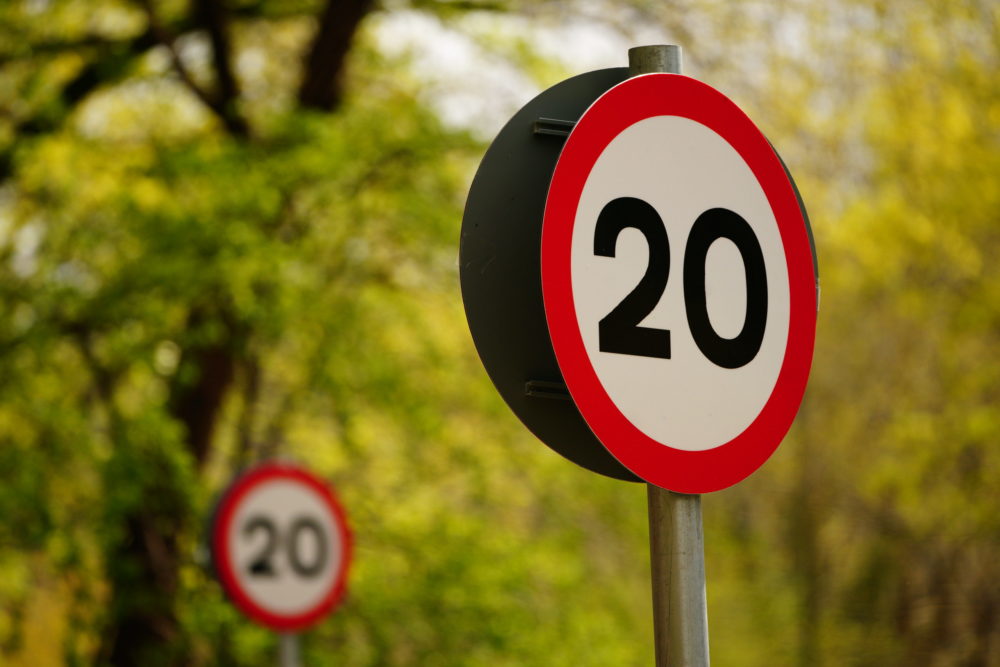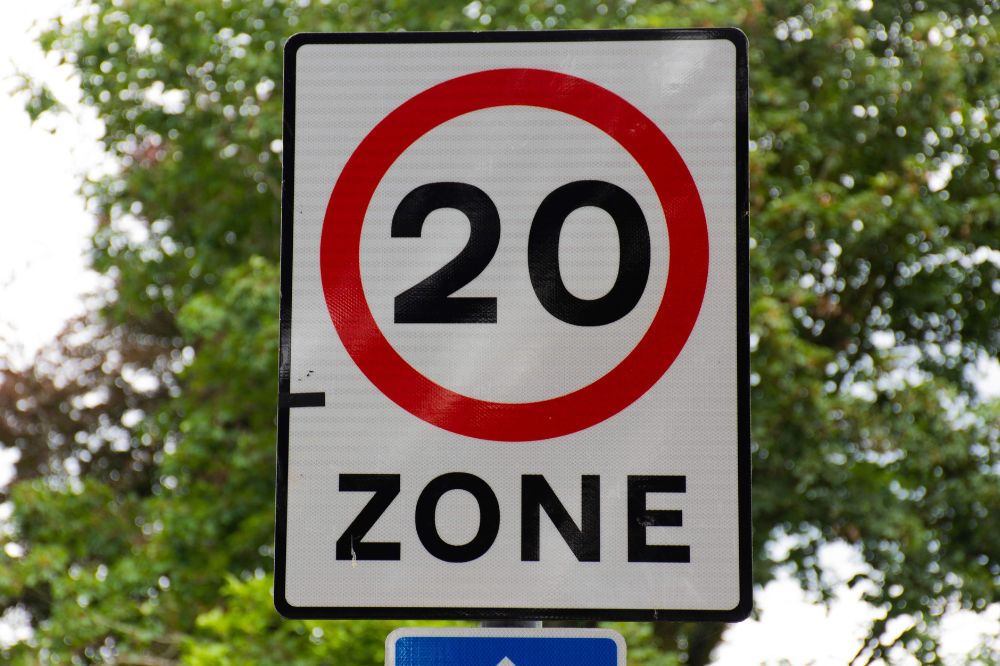20mph one year on: Welsh road casualties falling considerably faster than rest of GB

Gwenda Owen
GB-wide road casualty stats for 2023, released last week, showed small reductions in overall road casualties, but provisional figures from Welsh Government for the first three months of 2024 display a much more marked decline – largely due to its trailblazing 20mph default speed limit.
The release of road casualty stats published annually by the Department for Transport[1], highlighted a falling trend across GB in cycle and pedestrian fatalities for 2023. With less people killed or seriously injured, the direction of travel is obviously right, but the improvements are painstakingly slow.
The new figures indicate that there are now 20% fewer cyclist fatalities than a decade ago, but only 4% fewer than a year ago – reinforcing concerns that progress is not fast enough.
Yet, in Wales, things look very different. Interim statistics released by the Welsh Government[2] for the last quarter of 2023 and the first of 2024, show that casualties in road collisions are reducing much more quickly. Not only that, but they also show a reduction in the number of collisions overall.
The Welsh Government figures are provisional, but they tend to be generally consistent with final figures, giving a reliable idea of where we’re going.
Unless you’ve been living under a rock for a year, you’ll be well aware that Wales introduced the default 20mph speed limit on roads in built-up and residential areas. You might be even more aware of the backlash that followed.
Despite the backlash at the sudden change to road traffic law, since the limit has been in place, Wales has seen the lowest quarterly figures for road casualties outside the Covid pandemic period. In the first three months of 2024, there were 377 casualties on 20mph and 30mph roads combined. Compare that to 510 in the first quarter of 2023 and you can see how great an impact it’s had.

In that single quarter, the number of serious casualties or fatalities dropped 23% in Wales, while for Great Britain as a whole it’s taken a decade to achieve a similar figure – 28%.
In the six months after October 2023, following the 20mph policy being introduced, serious road casualties dropped by 17%, compared to the same period in 2022-23.
This is significant, because we’ve not seen results like this before. In recent years, there has not been such a great downward shift in the number of those killed or seriously injured on Welsh roads.
Although the 20mph default limit has caused a great deal of controversy, this is why it was rolled out. To save lives. It’s precisely why ex-Minister Lee Waters brought in the change – to improve the safety of Welsh roads, making neighbourhoods more liveable, less polluted and more pedestrian.[3]

I’ve seen it first hand when cycling around in both Wales and England – traffic speeds in England now feel wildly fast in comparison. Which is why it’s heartening that, despite the loud objections the Government has held its nerve – after all, having to slow down while driving may be an inconvenience but it pales in comparison when we consider the lives we’ve already saved.
On 25 September, the Senedd voted on scrapping 20mph in a motion brought forward by the Welsh Conservatives, but that vote was lost and an amendment by Labour passed instead, calling for the Welsh Government to continue supporting local authorities to deliver them in a targeted approach.
It’s clear that changing attitudes and behaviour takes time, but these initial figures are promising. Although it may be too early to tell yet, the 20mph limit is showing signs that it’s making our communities and roads safer. We can only wait for the final statistics set to come out in a year’s time to see if this trend plays out even more strongly.
Gwenda Owen is Cycling UK’s Wales advocacy lead.]
[1] Reported road casualties Great Britain, annual report: 2023 – GOV.UK (www.gov.uk)
[2] Casualties by speed limit and severity (gov.wales)
[3] Welsh 20mph Task Force Group (gov.wales)
Support our Nation today
For the price of a cup of coffee a month you can help us create an independent, not-for-profit, national news service for the people of Wales, by the people of Wales.







Would that be a blanket reduction in casualties across Wales?
This policy is definitely proof that you shouldn’t let perfect be the enemy of good. The process of deciding which roads should change locally was definitely a little messy but where necessary changes can be reversed. Road deaths and life changing injuries cannot.
Great comment
2023..Northern Ireland road deaths,35 people per million, Scotland 38 per million, Wales 34,per million, England 40 per million. The 20mph has been in Wales before last year in quite a few places ( non blanket ). Also reductions on 30,40,50,60, and 70 roads before last year. Not huge differences really.
What I have observed is that a majority of drivers do not adhere to the limits.
Aren’t the statistics also combining 20 and 30mph roads, which will escwe the numbers ?
There are two sets of numbers (a) that compiled by DfT covering Britain and each region including Wales, and (b) that compiled by the Welsh Government. The numbers are different which suggests a different way of counting. The DfT number says RTCs in Wales decreased from 3315 to 3255 in line with trends in other nations and regions but fatalities in Wales increased from 89 to 90 and did not show a decline as indicated in other nations and regions. It is only possible to get near the Welsh Government figures by removing casualties on retained 30mph roads for 2023.… Read more »
This i a perfect example of politicians picking and choosing which stats to publish.
Having worked for almost 15 years within science for an arm of the UK government it’s always been clear that there’s the answer they want and will be published regardless and the answers that will be ignored.
Take all these so called statistics with a very large pinch of salt.
Yes. RTC details are recorded by the police, who then categorise and report to the Home Office according to their criteria. This is the ‘data stream’. There is no separate reporting to the Welsh Government. There must be someone in Cardiff now employed to download this data-set and manipulate it to give the desired result for Welsh Ministers.
‘Wales has seen the lowest quarterly figures for road casualties outside the Covid pandemic period. In the first three months of 2024,’ – perhaps fewer people are cycling now so fewer road casulaties, or cyclist are more aware of cars and so doing fewer stupid things. The idea that a) 20 mph totally causes b) fewer casualties is simplistic. It might be part of the reason but then again it might not. Fewer tourists driving? Fewer people driving? And so on… I note the increased passengers on a rain line story today as well…
Why is it so hard to accept that slower speeds mean fewer and less serious incidents? If it wasn’t the case then it must also be true that faster speeds also don’t increase accidents and severity, so why bother with any speed limits at all.
It’s not a single variable. Traffic is dynamic. It depends on whether the lower speeds are in the right places and faster speeds are in elsewhere. This was the funding of the Belfast pilot. It found RTCs marginally increased as drivers were either breaking the speed limit or that additional traffic at higher speeds were caused on roads where lower speeds did not apply. It’s called displacement.
Then let’s double the speed limit to cause fewer and less severe accidents.
The Belfast study was an outlier which covered a specific part of a specific city. It is one study in a subject which has been widely researched and all the other many studies, both in the UK and elsewhere show that slower vehicle speeds reduce both the number and severity of collisions and the number of fatalities and serious injuries. Traffic speeds have measurably reduced on restricted roads in the past year and, predictably, so have accidents. Surely everyone should be pleased?
Agreed. And if anyone doesn’t believe that lower speeds reduce both the number and severity of collisions, ask yourself one very simple question: would I prefer a Range Rover to it hit me at 20mph or 30mph?
“It depends on whether the lower speeds are in the right places and faster speeds are in elsewhere. “
It depends on physics.
Specifically Newton’s second law of motion –
The force on an object is equal to its mass times its acceleration.
At 20mph there will be fewer collisions and collisions will be less severe (vehicle on vehicle/structure/human) than at 30mph.
Keep an eye on the costs of insurance policies for proof if you don’t trust Newton!
The misconception that the reduction in the 30mph speed limit to 20mph speed limit does not prove a success. Why because there are severn constituent parts to a road accident. Speed just happens to be one! The main consistant part being the driver. However as we all know the difficulty in prosecuting an individual is difficult but, why not photogragh the licence plate of a vehicle and then summons the registered keeper. Much cheaper and greater value as the likelihood of a contested court case is slim so court costs are also diminished. Considering that in 2018 UK government national… Read more »
I’d like to know why Welsh Government seems to have different statistics compared to the Department of Transport? And do we have granular breakdown of where the reductions occurred? I’m particularly interested in areas around schools. Some of these roads previously had prominent signage, roadside and painted on the roads, telling drivers to slow down. This signage was removed, and made less prominent, when the default 20mph limit came in. Changing it was a legal requirement.
I’ll write it again IT’S IMPOSSIBLE TO CLARIFY IF ROAD ACCIDENTS ARE FROM SPEEDING UNLESS YOU LOOK AT EVERY ACCIDENT involving vehicles. The way road accidents are classified does not take into account everything / everyone one involved. Different authorities register road accidents in different ways , insurance companies register road accidents in different ways . I’m not against lowering speed outside schools etc but on main roads with no shops etc it’s wrong.
“but on main roads with no shops etc it’s wrong.”
but you wrote (again)
“IT’S IMPOSSIBLE TO CLARIFY IF ROAD ACCIDENTS ARE FROM SPEEDING “UNLESS YOU LOOK AT EVERY ACCIDENT involving vehicles.
Therefore you negate your “but on main roads….” statement on speed limits.
Raw statistics can be misleading…. which areas…. which road types… so many other factors… but a good statistic is the over half a million residents of wales who thought the imposition without consultation of this limit was unacceptable. Without a proper analysis it is so easy to mislead….
A nice bit of Propaganda!